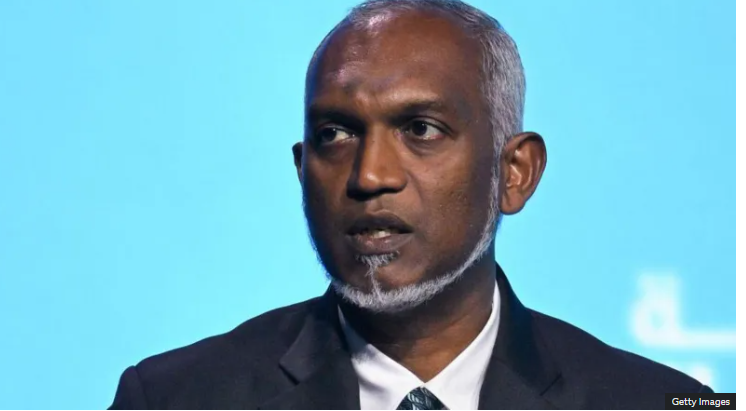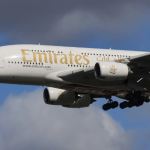Maldivian President Mohammed Muizzu has expressed confidence in India’s support as the island nation grapples with an economic crisis. In an email interview with the BBC ahead of his five-day visit to India, Muizzu stated he expects to seek a bailout worth hundreds of millions of dollars to address the Maldives’ mounting financial challenges.
The Maldives is currently facing the risk of a debt default, with foreign exchange reserves dwindling to $440 million (£334 million), sufficient for only about a month and a half of imports. “India is fully cognizant of our fiscal situation, and as one of our biggest development partners, will always be ready to ease our burden, find better alternatives, and solutions to the challenges we face,” Muizzu remarked.
Experts note that Muizzu’s reconciliatory tone toward India contrasts sharply with the rhetoric he employed during his election campaign a year ago, which prominently featured an “India out” policy demanding the withdrawal of Indian troops from the Maldives. When asked about his previous anti-India stance, Muizzu refrained from directly addressing it, stating, “We are confident that any differences can be addressed through open dialogue and mutual understanding.”
An Indian relief package could significantly bolster the Maldives’ foreign currency reserves. Last month, the global agency Moody’s downgraded the Maldives’ credit rating, citing that “default risks have risen materially.” However, Muizzu reassured that Male is not on the verge of a sovereign debt default and that the country would not seek assistance from an International Monetary Fund (IMF) program to navigate the crisis. “We have our own home-grown agenda,” he added.
Despite this, Moody’s has highlighted that the Maldives’ reserves remain significantly below the government’s external debt obligations, estimated at around $600 million in 2025 and over $1 billion in 2026. Given this backdrop, it remains unclear how Muizzu plans to secure the funds needed to address the reserves crisis, making his upcoming visit to Delhi particularly critical. India has previously extended financial support amounting to $1.4 billion to the Maldives for various infrastructure and development projects.
Since Muizzu assumed office in November 2023, relations between Male and Delhi have experienced strains, making the upcoming discussions even more significant.
Shortly after taking office, President Mohammed Muizzu opted to travel to Turkey and China, with his visit to China in January particularly noted as a high-profile snub to India. Traditionally, newly elected Maldivian leaders have made their first overseas visit to Delhi. Around the same time, controversy arose in India when three Maldivian officials made derogatory comments about Prime Minister Narendra Modi.
Muizzu also issued an ultimatum for India to withdraw approximately 80 troops stationed in the Maldives, which Delhi had sent to maintain and operate two rescue and reconnaissance helicopters and a Dornier aircraft donated years ago. Ultimately, both countries reached a compromise, agreeing to replace the Indian soldiers with civilian technical staff to operate the aircraft.
Furthermore, Muizzu’s administration decided not to renew a hydrographic survey agreement with India that had been established by the previous government for mapping the seabed in Maldivian territorial waters. In defense of his decisions, Muizzu stated, “The decisions taken are based on our evolving domestic interests and strategic priorities. The will of the people, that elected me 10 months ago.”
He also expressed confidence that both the Maldives and India now have a better understanding of each other’s priorities and concerns. Some of Muizzu’s actions were interpreted as efforts to diminish Delhi’s influence while fostering closer ties with China, India’s regional rival. For instance, in February, Muizzu’s government allowed the port call of a Chinese research vessel, Xiang Yang Hong 3, in the Maldives, which raised alarms in Delhi. Critics viewed this as a potential mission to collect data for the Chinese military, possibly for future submarine operations.
Despite this, Muizzu refutes the characterization of his administration as pro-China, stating, “I have made clear our foreign policy the day I took office – that it is a ‘Maldives First’ policy. Our relationships with other nations are guided by the principles of mutual respect and trust, non-interference, and the pursuit of peace and prosperity.” He added, “We believe that through open communication and collaboration, we can address any concerns, contributing to a peaceful and prosperous Indian Ocean region.”
Despite Muizzu’s attempts to move Male closer to Beijing, analysts say financial assistance from China hasn’t been forthcoming,
As a result, the president’s extraordinary turnaround towards India now is based on harsh realities.
Muizzu’s Delhi visit “is a realisation of how dependent the Maldives is on India, a dependency that no other country will find easy to fill”, says Azim Zahir, a Maldivian analyst.


